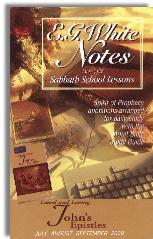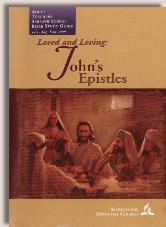|
||||||||||||||
Commentary on "Jesus and the Johannine Letters"
Day 3: Monday, June 29, 2009
This lesson discusses the content of John's epistles. The author points out that John spoke about false teachers and heresy creeping into the church and that, in both 1 and 2 John, he uses the term "antichrist" to refer to the purveyors of heresy. The lesson also demonstrates that the essential message of all three epistles is similar. The thought questions for the day ends with this: "John, though, whatever his emphasis on love, didn't shy away from dealing with theological error. What should this tell us regarding how we should act in the face of theological error in our own church?"
Problems
Once again the underlying problem with this lesson is the underlying misunderstanding of the biblical gospel. While the words sound "right" superficially, they are being taught to Adventists who understand salvation to include one's own faithfulness and commitment to perfection instead of salvation being solely the gift of God in Jesus Christ with no contributing faithfulness or work or demonstration of loyalty on our part securing eternal life for us.
The E.G. White notes for this day include a quote from Review and Herald, March 16, 1911, which demonstrates this misunderstanding:
"Those who have had great privileges and opportunities, and who have failed to improve their physical, mental, and moral powers, but who have lived to please themselves, and have refused to bear their responsibilities, are in great danger, and in greater condemnation before God than those who are in error upon doctrinal points, yet who seek to live to do good to others, corresponding to the light which they have. Do not censure others, do not condemn them. As free moral agents under the government of God, our responsibility and obligation are not limited by the knowledge we actually possess, but by the knowledge we might and ought to have had if we had advanced in faith, and obtained the rich Christian experience that would have corresponded with our advantages. We should improve our faculties, and we shall be held accountable for their improvement. They are a sacred trust, and if w do not use then properly, if we do not educate ourselves to trust in God, to believe ad practice his word, we shall be held accountable. If we allow selfish considerations, false reasonings, and false excuses to bring us into a perverse state of mind and heart, so that we do not know the ways and will of God, we shall be far more guilty than the open sinner. We need to be very cautious, in order that we may not condemn those who before God are less guilty than ourselves."
The Bible does not teach that we are to improve our "physical, mental and moral powers" in order to please God. Neither does the Bible teach that people stand in less condemnation before God if they have strive to do good to others even though they have wrong doctrine.
Rather, the Bible teaches that the difference between pleasing and not pleasing God is the difference between being "in the flesh" or "in the Spirit". Here's how Romans 8:5-11 explains it:
"For those who live according to the flesh set their minds on the things of the flesh, but those who live according to the Spirit set their minds on the things of the Spirit. To set the mind on the flesh is death, but to set the mind on the Spirit is life and peace. For the mind that is set on the flesh is hostile to God, for it does not submit to God's law; indeed, it cannot. Those who are in the flesh cannot please God. You, however, are not in the flesh but in the Spirit, if in fact the Spirit of God dwells in you. Anyone who does not have the Spirit of Christ does not belong to him. But if Christ is in you, although the body is dead because of sin, the Spirit is life because of righteousness. If the Spirit of him who raised Jesus from the dead dwells in you, he who raised Christ Jesus from the dead will also give life to your mortal bodies through his Spirit who dwells in you."
The difference between being "in the flesh" and "in the Spirit" is not the difference between internally committing to doing good and sincerely following what one believes and being purposefully lax and undisciplined, allowing one's mind and body and morals to just do whatever they wish. Rather, the difference between being in the flesh and in the Spirit is the difference between being a natural man who is by nature an object of wrath (Ephesians 2:3), or a born again believer in the Lord Jesus made alive with Christ even while still dead in sins by an act of God when one has believed in Jesus' atoning death and death-defeating resurrection (Ephesians 2:4-10; 1:13-14).
No amount of sincerity or good works will justify or ingratiate one with God. Only trusting in Jesus alone and placing one's entire faith in Him will result in any favor with God.
Our own self-discipline and sincerity do nothing to place us in good standing with Him.
Only in Jesus do find justification with God.
Summary
• One cannot perceive heresy or false teachings when one's worldview is shaped by a foundation of false teachings.
• A commitment to developing one's mental, physical, and moral powers does nothing to place us in favor with God or to gain spiritual maturity.
• Only being born again by the indwelling Holy Spirit who is the seal of God given to us when we believe in Jesus' completed atonement for our sin places us in favor with God.
• Sincerity and good works done by one who is not born again do not place one in favor with God.
• Only in Jesus does one find justification with God.
Copyright 2008–9 BibleStudiesForAdventists.com. All rights reserved. Revised June 26, 2009. This website is published by Life Assurance Ministries, Glendale, Arizona, USA, the publisher of Proclamation! Magazine. Contact email: BibleStudiesForAdventists@gmail.com.
The Sabbath School Bible Study Guide and the corresponding E.G. White Notes are published by Pacific Press Publishing Association, which is owned and operated by the Seventh-day Adventist church. The current quarter's editions are pictured above.
Official Adventist Resources
Standard Edition Study Guide Week 1
Teacher's Edition Study Guide Week 1
Easy Reading Edition Study Guide Week 1
Search the Complete Published Ellen G. White Writings


